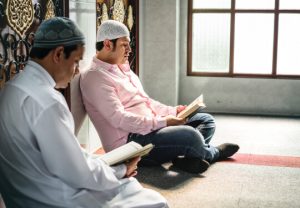PROCEDURES
GUIDELINES FOR ESTABLISHING MOONSIGHTING
THE HILAAL COMMITTEE OF
METROPOLITAN TORONTO & VICINITY –
CANADA –1015 DANFORTH AVE. TORONTO, ONTARIO, CANADA M4J 1M1
METHOD OF ESTABLISHING THE NEWS FOR MOONSIGHTING – PART 1
Islamic months are usually either 29 days or 30 days: there is no Islamic month that is of either 28 days or 31 days. If the 30 days of any Islamic month are complete then the sighting of the moon is not necessary for the upcoming month. In other words the next month would start automatically. However, sighting of the month is necessary after the 29th day of a lunar month to determine the next month’s arrival. In this, the most important of all the moon sightings are the moon sightings for the months of Shaban, Ramadhan, Shawwal and Zhul Hijj.The reason for their importance is very clear because different forms or worship such as fasting, pilgrimage, and sacrifice is related to them.
Moreover, there is a difference in moon sighting for the beginning of the month of Ramadhan and the end of it. The end of the month Ramadhan would necessitate two different things one is that if the month is only of 29 days and someone claims to have sighted the moon then it
would reduce one day of obligatory fasting and the second because it is Haraam (forbidden) to fast on Eid it would be obligatory to avoid fasting on that day. This is the reason that the jurists have taken more caution particularly in moon sighting at the end of the month of Ramadhan. It is a rule that there is more caution taken based on the degree of apprehension. Therefore, to accept the moon sighting of 29th of Ramadhan, a firm and substantiated proof is necessary.
There are two forms of accepting someone’s testimony in Islam.
•Khabr as Saadiq
•Shahadatush Shariyah Khabr as Saadiq is when someone trustworthy or reliable testifies that something is like this…..this testimony would be commonly applied and it is good only to his addressee. Shahadatush Shariyah is the second form of testimony according to Shari’ah in which there are some rules and regulations. To convince others of one’s beliefs Khabr as Saadiq would not be sufficient rather Shahadatush Shariyah is necessary for this task. Therefore, we should keep in mind an underlying principle that to change any definite state of affairs or arrangements we need a definite proof, assumption would not be sufficient. For example, on the 29th of Shaban we know definitely that we are in the month of Shaban, in order to change this reality we would need a definite proof and any doubt would not be suffice. Similarly, if it is 29th of Ramadhan then we know the present reality is Ramadhan, in other words Ramadhan is what we are in, in order to change this reality from Ramadhan to Shawwal we need some concrete proof that Shawwal has started otherwise we would wait until the 30th day is complete and start the month of Shawwal. The month of Shaban has no obligatory fasting or any such injunction associated with it hence the degree of proof needed to start the month of Ramadhan from Shaban is different. Whereas the month of Ramadhan is continuing with obligatory fasts hence to cease or end the month of Ramadhan and to start the month of Shawwal we would need a different degree of proof, more caution has to be taken in this latter category. Due to this difference of importance, if the horizon is not clear or cloudy one man’s testimony would be sufficient at the end of the month of Shaban to start Ramadhan whereas to end Ramadhan two men’s testimony would be necessary. So, to decide the moon sighting on the 29th of the month of Shaban there would be two different scenarios.
- The horizon is very clear
- The horizon is cloudy and not clear The ruling would be different in both of the above-mentioned scenarios.
- If the horizon is clear, then the requirement is that a big group of people should have witnessed the moon sighting.
- On the other hand, if the horizon were not so clear then to start the month of Ramadhan one ‘just witness’ is that the witness should be righteous, practicing of Islamic teachings, and should not be ‘Majhoolul Hal’ or ‘Masturul Hal’ (the witness is not known to anyone).
- If the form of testimony is such that a person comes to a group or committee of scholars, given that the body of scholars is authentic and the community has trust in them or their principles of Fiqh and criteria of Islamic shahadah, and says that I bear witness that at this night at such place I sighted the moon and that committee of scholars accepts that testimony. This form of testimony is recognized in the Shariah as ‘Shahadah A’lar Ru’yaah’ Similarly on the 29th of the month of Ramadhan there are two scenarios.
- The horizon is clear
- The horizon is not so clear and cloudy. The ruling would be different in both scenarios.
- If the horizon is clear then a big group of people should testify to sighting the moon and only their testimony would be reliable.
- If the horizon is not so clear then two witnesses should testify to sighting the moon. The testimony itself is of three different kinds
- Shahadah Alar Ru’yaa-Testimony of moon sighting, which is mentioned above.
- Shahadah Alasshahadatir Ru’yaa- To testify on the testimony of someone who sighted the moon. Ex. would be that for every witness there are two witnesses who attest to the fact that I bear witness that so and so said that I sighted the moon on such and such night in such and such place. Another aspect of this testimony is that if a committee of scholars, which has governance over a certain location or region, approves of someone’s testimony that would be sufficient for the people of that location.
- Shahadah Alal Qadha- This is a testimony where two or more persons who witnessed the moon sighting in person to testify in front of a committee of scholars from another region (and if the committee has approved of their testimony) those two witnesses would be reliable and authentic. Hence, it would be decided in favor of the endorsement of the moon.
METHOD OF ESTABLISHING MOONSIGHTING
- All efforts should be made to sight the moon locally.
- Use a base of scientific facts as a standard for accepting moon-sightings. To achieve this, help can be taken from the experts in the field of astronomy, but the judgment will never ever under any circumstances be dependent upon them, the judgment should always be upon actual sighting. In summary, we have to decline sightings that are inconsistent with generally agreed on scientific models of crescent visibility.
- We do not need to rely on calculations for the timing of the occasions, but rather it is just to establish a baseline of acceptability of reported sightings.
- If there is possibility of a sighting anywhere in Canada (Imkanu-Ru’yat) at the end of the 29th day after Maghrib, if the moon is on the horizon, then all efforts should be made to sight the moon locally.
- If the moon cannot be sighted in Canada then we can accept the sighting of another region (city) of North America & Caribbean Islands i.e. Trinidad, Tobago, Guyana, Barbados in addition to those South American regions which are with in 1 and a half hour (+/-) of our time zone, on the condition that the actual sighting information is correct, reliable and verified, (Muhaqqaq Ru’yatul Basari) and the moon sighting criteria followed by that region, is accepted by the Shariah.
- If at the end of the 29th day, there is no possibility of sighting the moon in Canada or North America & Caribbean Islands i.e. Trinidad, Tobago, Guyana, Barbados in addition to those South American regions which are with in 1 and a half hour (+/-) of our time zone. I.e. the moon is not on the horizon, we will still follow the Sunnah and exhaust all efforts in trying to sight the moon. However on this occasion, the testimony of one or two witnesses will not be deemed as acceptable, rather, the testimony of a large group will be necessary (Jamm al ghafir) as is the case, when the skies are clear. If this condition does not exist (i.e. if the moon is not sighted anywhere locally or in North America & Caribbean Islands i.e. Trinidad, Tobago, Guyana, Barbados in addition to those South American regions which are with in 1 and a half hour (+/-) of our time zone or when
there is no possibility of moon being sighted and testimony of a large group is not there, or if we do not receive correct, reliable sighting report (Muhaqqaq Ru’yatul
Basari) from another region of North America & Caribbean Islands i.e. Trinidad, Tobago, Guyana, Barbados in addition to those South American regions which are with in 1 and a half hour (+/-) of our time zone, then thirty days will be completed for that month. - The issue of shahadah (testimony) of moon sighting from reliable Muslims is extremely important due to which, the reliance on astronomical data is considered secondary in this regard.
- The definition of jumm al-ghafir (large number of witnesses) is when a group of people (of any number of people) cannot be considered to be lying about a sighting of the crescent moon.
- People should not make up their minds in advance about the impossibility of the sighting rather people should be encouraged to sight the moon regardless of the astronomical data available so that they are rewarded for observing this form of ibadah.
- A time should be fixed for making a decision based on information received from another area. If no news is received on the fixed time, then 30 days should be completed, thereafter an announcement should be made. However if a testimony or information is received through a reliable source then it will become compulsory to make a decision according to that.
- The fixed time for receiving news from another area during the lengthier days will be up until 2 hours after sunset in the corresponding area or dependent upon the opinion of the committee.
METHOD OF ESTABLISHING THE NEWS FOR MOONSIGHTING – PART 2
If any of the conditions below are established with the relevant criteria (highlighted above) a declaration can be made:
- Two trustworthy persons gave testimony of their sighting in front of a genuine moon sighting committee, which has been approved and verified.
- Information received or collected via telephone in regard to the commencement of the Islamic months excluding Ramadhan has the same legal ruling as correspondence via letter. When the committee is convinced that this is the very same person with whom contact was established. He is pious and the person making the call knows him well, and can be verified through other sources then a declaration can be made after full satisfaction.
- The testimony of a witness deemed unacceptable through external evidence can be rejected. Similarly the testimony of a fasiq (transgressor) can be accepted if validated by an external evidence
- Information in relation to the decision of a genuine moon sighting committee is received via telephone or cellphone, the voice of the informant is recognised and confirmed, or the accuracy of the information is known through other sources or means.
- Information regarding the sighting is received through, fax or internet. This will only be deemed acceptable when actually confirmed by the chair of the committee or a reliable person of that particular locality.
- An abundance of telephone calls, faxes, e-mails and letters are received from a particular or various locations, reaching the status of istifadha (over whelming sources of information that cannot be doubted) resulting in the committee being convinced that the moon being has been sighted.
- The moon sighting committee sends a reliable person to a certain place, to inspect their ruling. He returns and gives a pronouncement in favour of the sighting.
- A letter/fax from the chair of a moon sighting committee or his associates, mufti, or whoever made the decision is received by the local committee or chair and they are convinced of the sighting.
- An overwhelming no. of telephone calls, faxes, letters or e-mails are received from a certain location or locations which leads to the undeniable fact of the moon being sighted.
- The moon sighting committee for a specific region, whose members are all trust worthy, religiously conscious or the mufti, scholar of a particular locality after receiving a valid testimony has given approval for the sighting.
- A phone call was received by the committee from the chairman-associate of the moon sighting committee of the specific region. The information has been authenticated through various means and the news reached the stage of surety.
- The moon sighting committee received a certain number of phone calls from various places of the same region from so and so persons and these have been authenticated by the committee.
PROCESS OF TAKING TESTIMONY
Principally, the responsibility of taking testimony on moonsighting and making announcement on the commencement of the respective months accordingly lies with the Qadhi or Hakim. In non-Muslim countries or countries with Muslim minorities, the Muslims may adopt any one of the following to facilitate this function:
Appoint an ameer or leader;
- Setup Hilaal committees
- Each locality appoints any reputable/genuine scholar as an authority.
(Umdah al-Riaayaha vol.1 pg.309)
After the testimonies are taken and an announcement is made accordingly, then the decision reached by any of the above 3 groups is binding upon its area of jurisdiction. Hereunder are a few guidelines which although may not be applied absolutely, are generally persuasive in ensuring that the testimony is satisfactorily authenticated resulting in an accurate ruling: - The witness should be reminded of the serious consequences and repercussions of his testimony and of his accountability unto Allah;
- Testimony should not be taken if the skies were clear. This is because in this condition, the testimony of 1 or 2 people will not suffice;
- Generally, if a person sees the moon once, he will see it a second time with relative ease. If the witness saw it once and was unable to see it a second time, the possibility that might have been mistaken is increased.
- One who has seen the moon will be able to show another with relative ease. If this second person was unable to see it, despite the witness pointing it out to him, it will create doubt in the testimony of the witness;
- The witness should not merely give an account of his experience but should use the words of testimony thereby sensitising him of the seriousness of his actions
- The body language and facial expressions of the witness should be observed. He should not seem pressurised to give testimony.
- A pertinent point to bear in mind is that the one taking testimony is not obligated to accept the testimony merely on the basis that there are witnesses presented who are prepared to testify. If the testimony is not convincing due to outside factors or inconsistencies, then the testimonies may be rejected and the resultant ruling will be binding. And Allah Ta’āla Knows Best




